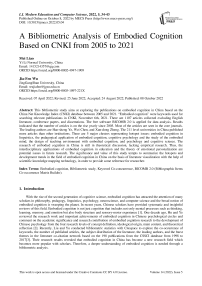A Bibliometric Analysis of Embodied Cognition Based on CNKI from 2005 to 2021
Автор: Mei Liao, Jia-Fen Wu
Журнал: International Journal of Modern Education and Computer Science @ijmecs
Статья в выпуске: 5 vol.14, 2022 года.
Бесплатный доступ
This bibliometric study aims at exploring the publications on embodied cognition in China based on the China Net Knowledge Index (CNKI) database between 2005 and 2021. “Embodied cognition” were keywords used for searching relevant publications in CNKI, November 6th, 2021. There are 1107 articles collected excluding English literature, conference papers, and dissertations. The free software BICOMB 2.0 is applied for data analysis. Results indicated that the number of articles is on the rise yearly since 2005. Most of the articles are seen in the core journals. The leading authors are Hao-sheng Ye, Wei Chen, and Xun-dong Zheng. The 211 level universities in China published more articles than other institutions. There are 5 major clusters representing hotspot issues: embodied cognition in linguistics, the pedagogical application of embodied cognition, cognitive psychology and the study of the embodied mind, the design of teaching environment with embodied cognition, and psychology and cognitive science. The research of embodied cognition in China is still in theoretical discussion, lacking empirical research. Thus, the interdisciplinary applications of embodied cognition in education and the theory of emotional personalization are potential issues in future research. The significance and value of this study tempts to summarize the hotspots and development trends in the field of embodied cognition in China on the basis of literature visualization with the help of scientific knowledge mapping technology, in order to provide some reference for researcher.
Embodied cognition, Bibliometric study, Keyword Co-concurrence, BICOMB 2.0 (Bibliographic Items Co-occurrence Matrix Builder)
Короткий адрес: https://sciup.org/15019087
IDR: 15019087 | DOI: 10.5815/ijmecs.2022.05.04
Список литературы A Bibliometric Analysis of Embodied Cognition Based on CNKI from 2005 to 2021
- Yin, R., Qu, F.-B., & Ye, H.-S. (2012). Research on embodied theories of conceptual representation. Advances in Psychological Science, 20(9), 1372-1381.
- Hu, W. N. Y., H.S. (2013). The Research Progress of Embodied Cognition in Chinese Psychological Science. Journal of Dialectics of Nature, 35(6), 111-115.
- Liu, H., & Yu, L. L. (2020). The Scientometric Study of Research Hot Topics and Fronts of Embodied Cognition in China. Journal of Xi’an International Studies University, 28(1), 17-21.
- Li, Q.-W. (2008). Cognitive revolution and second-generation cognitive science. Acta Psychologica Sinica, 40(12), 1306.
- Ma, Y. Q., & Zhao, J. (2010). Embodied Cognition: New Insights on Body-mind Relationship. Journal of Xuzhou Normal University(Philosophy and Social Sciences Edition), 36(5), 138-142.
- Ye, H. (2014). Theoretical analysis of the meaning of embodiment. Acta Psychologica Sinica, 46(7), 1032-1042.
- Repaso, J. A. A., Capariño, E. T., Hermogenes, M. G. G., & Perez, J. G. (2022). Determining Factors Resulting to Employee Attrition Using Data Mining Techniques. International Journal of Education and Management Engineering,12(3), 22-29.
- Fu, Y., & Zhang, Z. (2019). A Bibliometric Analysis of International Advances in L2 Motivation Research (2004-2018). The Jungang Journal of English Language and Literature, 61(4), 285-312.
- Zhou, J. F., & Xie, B. J. (2020). Research Progress of Konjac Study in China and Aboard Based on Bibliometrics. Journal of Food Science and Technology, 38(5), 91-99.
- Guo, W. B. (2015). Application of the Theory of Mapping Knowledge Domain in Educational and Psychological Research. Zhejiang University Press 5, HangZhou.
- Guo,W. B., & Zhang, C .C. (2017).The Study of Hot Spots and the Development of Inclusive Education in China. Disability Research (03),63-69.
- Latif, S., Dola, F. F., Afsar, M. D., Esha, I. J., & Nandi, D. (2022). Investigation of Machine Learning Algorithms for Network Intrusion Detection. International Journal of Information Engineering and Electronic Business, 14(2). 1-22, 2022.
- Kumar, B. V., & Marutheswar, G. V. (2019). Multi Quadrant Operation of Brushless Direct Current Motor Drive with PI and Fuzzy Logic Controllers. International Journal of Information Engineering and Electronic Business, 11(3), 25-32.
- Wilson, M. (2002). Six views of embodied cognition. Psychonomic Bulletin & Review, 9 (4), 625-636.
- Hassan, M. M., & Mirza, T. (2021). The digital literacy in teachers of the schools of Rajouri (J&K)-India: Teachers perspective. International Journal of Education and Management Engineering, 11(1), 28-40.


